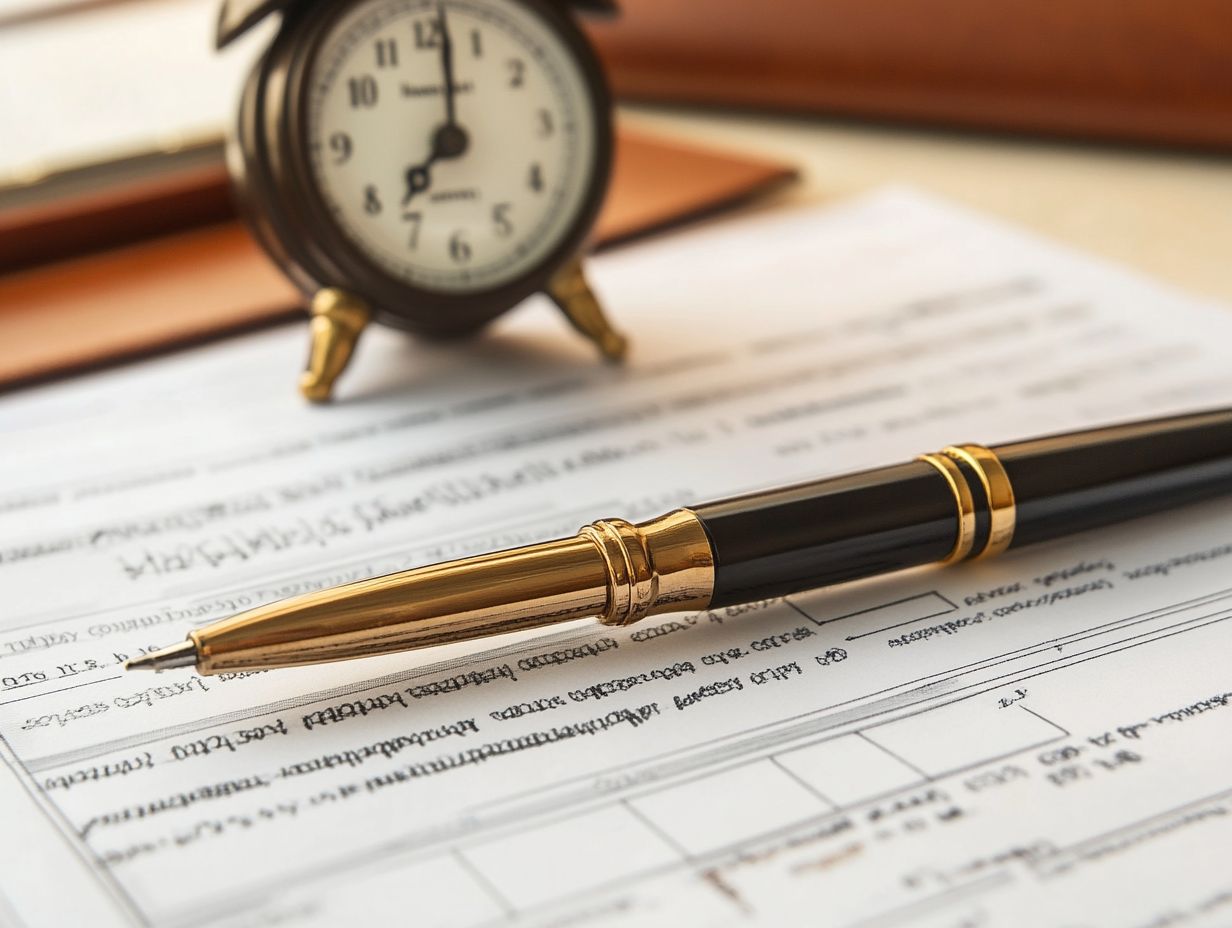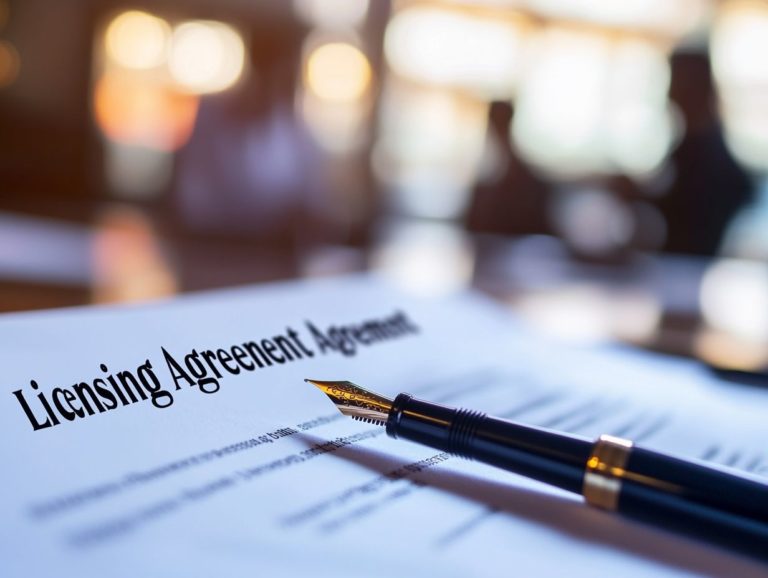Understanding the Duration of Licensing Agreements
Licensing agreements are important in various industries. They enable businesses to leverage each other’s strengths for mutual advantage.
This article explores the details of these agreements, focusing on their duration. You ll gain a clear understanding of what licensing agreements entail and explore essential elements that define them. This includes critical terms and conditions that shape their framework.
Uncover the benefits and potential risks associated with long-term agreements. We ll also discuss practical strategies for negotiating the ideal duration. Get ready to uncover valuable insights that will empower your licensing journey!
Contents
- Key Takeaways:
- Overview of Licensing Agreements
- Key Elements of a Licensing Agreement
- Duration of Licensing Agreements
- Benefits of Long-Term Licensing Agreements
- Potential Risks of Long-Term Licensing Agreements
- Negotiating the Duration of a Licensing Agreement
- Frequently Asked Questions
- What is the duration of a licensing agreement?
- How long can a licensing agreement last?
- Factors Influencing Licensing Duration
- Can the duration of a licensing agreement be extended or renewed?
- What happens if a party wants to terminate a licensing agreement before its duration ends?
- Is it possible to renegotiate the duration of a licensing agreement?
Key Takeaways:

Licensing agreements are contracts that give one party the right to use another party’s creative works like inventions or brand names for a specified time. The duration of a licensing agreement can significantly impact the stability, growth opportunities, and flexibility of both parties. When negotiating the duration, it s important to consider the specific needs and goals of both sides.
Overview of Licensing Agreements
Licensing agreements are essential for legally sharing and leveraging protected materials while adhering to the terms set forth in the agreement.
At its core, a licensing agreement is a legal contract between you, the licensor, and the licensee. It grants rights to utilize intellectual property such as patents, trademarks, or copyrights.
This arrangement often includes royalty payments and stipulations concerning exclusive rights and geographical limitations. These elements are vital for successful contract management and negotiation.
Definition and Purpose
A licensing agreement is a legally binding document that outlines the terms under which you can use another party’s creative works.
This contract serves multiple purposes in business transactions, primarily protecting the interests of both the licensor and the licensee.
It clarifies the scope of use, duration, and territory for the intellectual property, ensuring you fully understand your rights and responsibilities.
This type of agreement closely interacts with other legal contracts, establishing a framework for enforcing intellectual property rights. By setting clear guidelines, these agreements protect creative works while fostering fair use and innovation.
Key Elements of a Licensing Agreement
A well-structured licensing agreement includes essential elements that clearly define the rights and obligations of both the licensor and the licensee.
This clarity enhances understanding and significantly reduces the potential for disputes down the line.
Terms and Conditions
The terms and conditions of a licensing agreement are crucial. They outline the scope of use, responsibilities, and limitations you must follow as the licensee.
Understanding the intricacies of these agreements can greatly influence your operational freedom. They define your rights to utilize the relevant intellectual property, detailing whether licensing fees apply and how they will be structured.
Pay attention to the contract’s duration, as it dictates how long these rights are conferred. Geographical restrictions may also limit your use to specific areas.
Engaging legal counsel is essential for navigating these complexities, ensuring you fulfill all obligations and avoid potential pitfalls.
Duration of Licensing Agreements

The duration of licensing agreements is a crucial factor influencing your strategies and operational timelines.
Whether you re engaging in short-term contracts or establishing long-term partnerships that span several years, this aspect will shape your approach and outcomes.
For more information on licensing agreements, consider consulting a legal expert or exploring additional resources.
Factors Affecting Duration
Several factors can influence the duration of your licensing agreement, which is a contract allowing someone to use your property. These include market conditions, the specifics of the intellectual property, and the aspirations of both the licensor and licensee.
Opportunities for market expansion can significantly shape your negotiations. If you re in a rapidly growing sector, a shorter agreement period may be beneficial. This allows you to remain agile as trends shift.
The adaptability of your licensing framework is also crucial. Take Microsoft as an example. They ve customized their agreements to enable swift pivots based on user feedback and technological advancements.
Industry standards play a crucial role in determining negotiation lengths. They set benchmarks for quality and performance.
In the entertainment realm, Disney expertly navigates intricate agreements. They uphold their brand integrity while meeting market expectations, illustrating the complex interplay of these factors.
Benefits of Long-Term Licensing Agreements
Long-term licensing agreements can be a game changer! They present a wealth of benefits for both licensors and licensees.
These arrangements generate consistent royalty payments, bolster brand recognition, and pave the way for gradual market expansion.
Embracing long-term agreements can elevate your business strategy and open doors to new opportunities.
Stability and Growth Opportunities
The stability offered by long-term licensing agreements can unlock significant growth opportunities. You can enjoy predictable sales revenue and the potential to forge valuable third-party partnerships.
This stability lets you allocate resources wisely, setting you up for success and allowing you to plan for the future.
Take major companies like Disney; they ve mastered the art of licensing. By collaborating with manufacturers, Disney integrates its beloved characters into many products. This boosts their sales revenue significantly.
Similarly, brands like Coca-Cola harness long-term licensing agreements with local distributors. This ensures consistent product availability and brand visibility. This approach reinforces their financial stability and cultivates customer loyalty across diverse markets.
Potential Risks of Long-Term Licensing Agreements
While long-term agreements offer benefits, they also come with potential risks. These risks can impact the flexibility and adaptability of both the licensor and the licensee.
It’s essential to weigh these factors carefully as you navigate this landscape.
Impact on Flexibility and Adaptability

The impact of long-term licensing agreements on your flexibility and adaptability can be significant. These agreements often bind both parties to specific arrangements, which may impede future negotiations.
This rigid structuring can stifle innovation and responsiveness. It may make it difficult for your organization to pivot in response to changing market dynamics or technological advancements.
When you and your stakeholders are locked into pre-established terms, you risk missing out on opportunities to seize emerging trends or adjust strategies based on competitor actions.
Thus, it s essential for you to prioritize flexibility during negotiations. Allow adjustments that accommodate shifts in the landscape. This ensures that both parties can thrive amid uncertainty.
By emphasizing adaptable clauses, you create an environment that fosters collaboration. This allows innovation to thrive, keeping your overall strategic decision-making agile.
Negotiating the Duration of a Licensing Agreement
Negotiating the duration of a licensing agreement is a crucial step. It demands careful consideration of several factors.
Think about the unique needs of both parties involved, as well as the overarching long-term business strategy.
Wondering how you can maximize the benefits of licensing agreements? Let s explore!
Tips for Finding the Right Duration
Finding the right duration for a licensing agreement requires a careful plan that helps both the licensor (the owner of the product or service) and licensee (the party being granted the license) achieve their goals.
Start by assessing current market trends. They can offer valuable insights into demand and the potential longevity of the product or service in question. Understanding the legal jurisdiction is also important, as this can directly impact enforceability and compliance requirements.
Incorporating quality control measures is essential to ensure that standards are upheld throughout the life of the agreement.
Lastly, stay flexible and ready to adapt! Being open to renegotiations or adjustments fosters a healthier partnership, enabling both parties to respond effectively to changing market conditions.
Frequently Asked Questions
What is the duration of a licensing agreement?
A licensing agreement is a contract between two parties that outlines the terms and conditions for using a licensed product or service. The duration refers to the length of time that the license is valid and in effect.
How long can a licensing agreement last?

The duration of a licensing agreement can vary and is typically negotiated between the licensor and licensee. It can range from a few months to several years, depending on the terms agreed upon by both parties.
Factors Influencing Licensing Duration
The duration of a licensing agreement can be influenced by various factors, including the nature of the licensed product or service, market demand, exclusivity of the license, and the financial aspects of licensing agreements, as well as the relationship between the licensor and licensee.
Can the duration of a licensing agreement be extended or renewed?
Yes, the duration can be extended or renewed if both parties agree. This can be done through a contract amendment or a new licensing agreement. However, the terms of the extension or renewal must be negotiated and agreed upon by both parties.
What happens if a party wants to terminate a licensing agreement before its duration ends?
If one party wishes to terminate a licensing agreement before its duration ends, it is important to refer to the terms and conditions outlined in the agreement. Usually, there are provisions for early termination, which may include penalties or fees for breaking the contract.
Is it possible to renegotiate the duration of a licensing agreement?
Yes, the duration can be renegotiated if both parties agree to do so. This is especially relevant if there are changes in circumstances or if one party wishes to extend or shorten the agreement. Any changes should be officially documented in a contract amendment.
For more information on licensing agreements, feel free to reach out or explore further resources!






